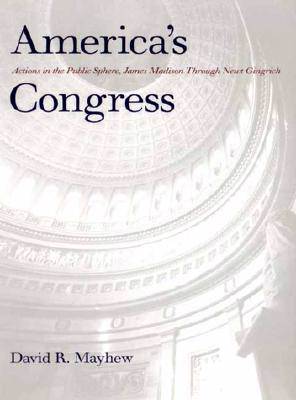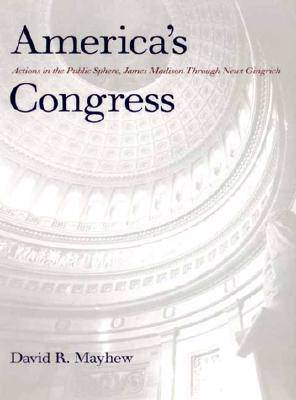
- Retrait gratuit dans votre magasin Club
- 7.000.000 titres dans notre catalogue
- Payer en toute sécurité
- Toujours un magasin près de chez vous
- Retrait gratuit dans votre magasin Club
- 7.000.0000 titres dans notre catalogue
- Payer en toute sécurité
- Toujours un magasin près de chez vous
America's Congress
Actions in the Public Sphere, James Madison Through Newt Gingrich
David R Mayhew
Livre broché | Anglais
74,95 €
+ 149 points
Description
To understand American politics and government, we need to recognize not only that members of Congress are agents of societal interests and preferences but also that they act with a certain degree of autonomy and consequence in the country's public sphere. In this illuminating book, a distinguished political scientist examines actions performed by members of Congress throughout American history, assessing their patterns and importance and their role in the American system of separation of powers. David R. Mayhew examines standard history books on the United States and identifies more than two thousand actions by individual members of the House and Senate that are significant enough to be mentioned. Mayhew offers insights into a wide range of matters, from the nature of congressional opposition to presidents and the surprising frequency of foreign policy actions to the timing of notable activity within congressional careers (and the way that congressional term limits might affect these performances). His book sheds new light on the contributions to U.S. history made by members of Congress.
Spécifications
Parties prenantes
- Auteur(s) :
- Editeur:
Contenu
- Nombre de pages :
- 288
- Langue:
- Anglais
Caractéristiques
- EAN:
- 9780300093353
- Date de parution :
- 08-02-02
- Format:
- Livre broché
- Format numérique:
- Trade paperback (VS)
- Dimensions :
- 130 mm x 203 mm
- Poids :
- 285 g

Les avis
Nous publions uniquement les avis qui respectent les conditions requises. Consultez nos conditions pour les avis.






